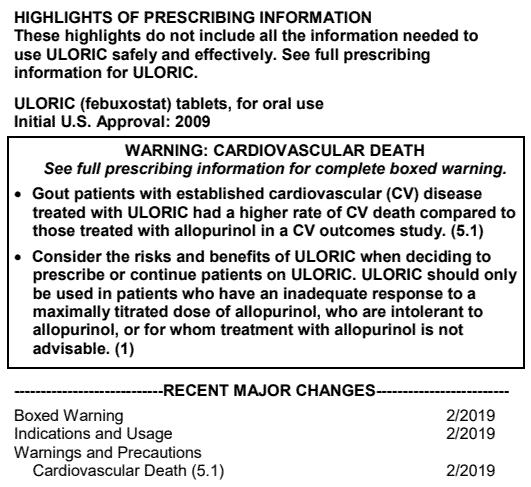Studies Indicate Uloric Creates Higher Risk of Mortality than Competing Gout Drugs
The FDA first approved gout medication Uloric (febuxostat) in 2009, but under one condition: the manufacturer, Takeda, had to agree to conduct a large postmarket safety clinical trial. The FDA was concerned about possible cardiovascular events with the drug and included a warning about the risk.
Takeda agreed to the clinical trial, which was conducted on more than 6,000 patients with gout and cardiovascular disease. About half of the patients took Uloric, and the other half took a similar drug called allopurinol.
The results compelled the FDA to recently add a black box warning to the product label alerting doctors and patients to the potential risk of heart-related death and death from all causes from Uloric.

Study Shows Uloric Creates a Higher Risk of Cardiovascular Death
The trial was called the “Cardiovascular Safety of Febuxostat and Allopurinol in Patients with Gout and Cardiovascular Morbidities (CARES)” trial. It was initiated in April 2010 and completed in July 2017. Researchers were looking mainly for cardiovascular events in those individuals taking the drugs, including:
- cardiovascular death,
- nonfatal heart attack,
- nonfatal stroke, and
- unstable angina with urgent revascularization.
They also looked at death from any cause.
The patients were followed for a median of 32 months. Results showed that even though the overall rates of cardiovascular events were similar in both groups, the rates of all-cause and cardiovascular deaths were higher in the febuxostat (Uloric) group than in the allopurinol group.
“Unexpectedly,” the researchers wrote,
“all-cause mortality was higher in the febuxostat group than in the allopurinol group, because of an excess of cardiovascular deaths.”
They added that the reason for these deaths was unclear.
Because of these results, the FDA updated the Uloric prescribing information to require a boxed warning, the most prominent warning, on the product label, as well as a new patient medication guide.
“We are also limiting the approved use of Uloric to certain patients who are not treated effectively or experience side effects with allopurinol,”
the FDA stated.
Public Citizen Calls for Uloric Removal from Market
On June 21, 2018, consumer advocacy group Public Citizen filed a petition with the FDA to have Uloric and other medications including febuxostat removed from the market for these reasons:
- Febuxostat increases the risk of death compared with alternative therapies.
- There are other medications approved by the FDA for the treatment of gout that have a lower risk of death.
The petition also made reference to a number of studies showing increased risks with febuxostat. These included the following:
- 2005: The New England Journal of Medicine published a study in which febuxostat was compared with allopurinol in patients with hyperuricemia (high uric acid levels) and gout. In that study, four deaths occurred among subjects receiving febuxostat, and no deaths occurred among those receiving allopurinol.
- 2008: Researchers published the results of the APEX trial, which also compared treatment with febuxostat and allopurinol. This trial also showed higher rates of serious adverse events among those using febuxostat.
The group also pointed to a new study published in 2018 comparing febuxostat with allopurinol, which concluded that among over 99,000 patients with gout, there was a trend toward increased (although not a statistically significant) risk for all-cause mortality in patients using febuxostat for over three years versus using allopurinol for over the same time period.
